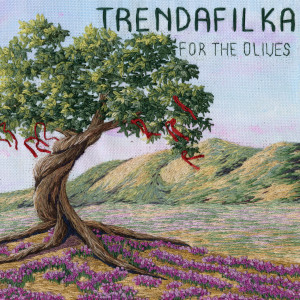 “Chichovite Konye,” the opening track on Trendafilka’s second album For the Olives was a good choice for its first single, as it presents the vocal group’s two sides in microcosm, as it were. Beginning with a stately, slow traditional polyphonic rendition of this girls’ coming of age song, two smaller choirs singing call and response, it then opens up into a modern arrangement, faster and with a more modern Bulgarian sound. It’s a superb introduction to this moving album.
“Chichovite Konye,” the opening track on Trendafilka’s second album For the Olives was a good choice for its first single, as it presents the vocal group’s two sides in microcosm, as it were. Beginning with a stately, slow traditional polyphonic rendition of this girls’ coming of age song, two smaller choirs singing call and response, it then opens up into a modern arrangement, faster and with a more modern Bulgarian sound. It’s a superb introduction to this moving album.
Trendafilka is an 11-piece women’s vocal ensemble singing a repertoire based on traditional folk songs of Eastern Europe — the Balkans, the Baltics, the Caucasus, and the Eurasian Steppe — all places with rich traditions of polyphonic singing. It’s a genre introduced to the West by the Bulgarian State Radio & Television Female Vocal Choir in the 1980s, and this music maintains a hard core of devoted fans worldwide.
The ensemble is based in New Orleans, with some members living there year-round and others splitting their time between there and the Balkans. Three of the singers also are vocalists in the New Orleans based Bulgarian band Blato Zlato, which I wrote about here and here. Lou Carrig, who sings and plays accordion in Blato Zlato, sings and is director for Trendafilka. Singers Annalisa Kelly and Ruby Ross also grace both groups. Trendafilka is rounded out by Anais Adair, Renee Anderson, Oak Fate, Grace Kennedy, Maria Rowinska, Elisabeth Stancioff, Phoebe Vlassis, and Eleanor Warner.
“We sing exclusively in polyphony, which is a style of singing that has occurred throughout the world since ancient times,” says Carrig. “The polyphonic styles we sing in range from archaic to modern, but the commonality is that they are musically non-hierarchical: multiple voices sing independent lines simultaneously, creating a textured, weaving sound. It requires the listener to tune into several melodies at once, but I think that’s what our audience enjoys the most: experiencing a lawful musical coexistence.”
The bulk of this generous 12-song album shies away from the upbeat excitement of the second half of “Chichovite Konye,” but there’s still a lot of variety in the program and I’m certain that some of the arrangements are more modern than traditional.
The second track “Zamruknala E Moma Yana” is a gentle hymnlike affair that commands attention through its quiet approach. It’s a harvest song about a young girl awaiting her lover. “Mori Aida, Aida” is similarly sedate; it’s a sad Bulgarian song about a young girl who has to sell her beloved horse.
Two songs are for Midsummer Night and are presented back to back. “Joninių Sutartinė” is Lithuanian, featuring mostly two mid-range voices singing twining lines about a lad and a lass who meet during the hay harvest. The arrangement brings to mind a couple of birds singing back and forth in a tree. And then comes the Ukrainian Midsummer Night song “Oi Na Ivana Na Kupala,” a very different arrangement with a large group singing in polyphony, long lines that end in a few silent beats before resuming.
A favorite of mine is the Bulgarian work party song “Zaspalo E Chelebiche,” a quartet arrangement that features high, low and middle voices rising in turn above the backing polyphony. It’s so stately and solemn it could be taken as a hymn rather than a work song on a theme of young lovers. The next one highlights the album’s excellent sequencing, a Latvian song titled “Nekuko Dzeguzite” with extremely close polyphony. Another special treat is the song from which the title comes, “Kaliora Na’ Xoun I Elyes,” an olive harvest song from the Greek island of Corfu, brought to the group by singer Phoebe Vlassis, whose family is from Corfu and who spent summers there growing up.
Overall, I have to say I personally prefer the more varied approach of a band like Blato Zlato with acoustic instruments and particularly a rhythm section. A full program of this intricate polyphony can feel a little overwhelming after a while. But that doesn’t at all diminish my love of this album, which I expect to continue listening to for some time to come. For the Olives is an utter joy of a record and deserves a spot on every World Music chart and list for 2024. This is utterly amazing and uplifting music.
(Trendafilka, 2024)
| Bandcamp | Apple Music | Spotify | Facebook | Instagram |
